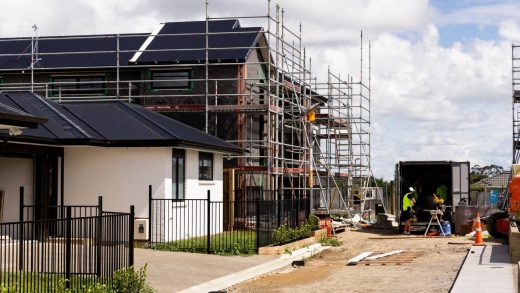
LOS ANGELES (AP) — Democrats have dominated California politics for years, but party infighting heading into Tuesday’s primaries could give Republicans an edge in swing U.S. House districts that are expected to help determine control of Congress.
In Southern California’s 47th District, which includes famed surf breaks in Huntington Beach and Laguna Beach, Democrats Dave Min and Joanna Weiss and their respective supporters are bickering through a haze of back-and-forth charges involving a drunken driving arrest and allegations of profiteering from sexual predators.
In the Central Valley farm belt, bitter exchanges between Democrats Rudy Salas and Melissa Hurtado in the 22nd District have prompted fears in the party that two Republicans could end up on the November ballot, with the Democrats boxed out.
With Republicans now holding a 219-213 edge, with three ovacancies, it’s hard to understate the stakes.
North Carolina Rep. Richard Hudson, who heads the House Republican campaign arm, has called the 47th District “probably our best pickup opportunity in the country.”
California puts all candidates, regardless of party, on one primary ballot. The two who get the most votes advance to the general election in November. The possibility for surprises is being fanned by the potential for a record-low turnout in which those most likely to vote are older, white, conservative-leaning homeowners, the state’s most reliable voters.
“A nasty primary campaign can be dangerous, especially when the other party has a strong candidate in the general election,” Claremont McKenna College political scientist Jack Pitney said of the 47th District. “It would take only a few percentage points to flip this seat from blue to red.”
While the Democrats exchange personal attacks and burn through hundreds of thousands of dollars of campaign cash for the Orange County seat, the leading Republican, former legislator Scott Baugh, has been freed to spend his time reaching out to undecided voters.
Jon Fleischman, former executive director of the state Republican Party and an informal Baugh adviser, predicted that if Min or Weiss reaches the November ballot, either will have a hard time consolidating a divided Democratic base after a harsh-toned campaign.
Longtime Democratic consultant Roger Salazar, who is not involved in either contest, said party infighting is never welcome but “it’s part of the democratic process.” He also noted that with the general election far off, the dynamic in the two races is likely to change after the primary.
“I’ve always been of the opinion that tough battles make you stronger,” Salazar said.
The two contests are among about 10 competitive House districts in California, with a handful of toss-ups likely to figure in which party controls the House. The decisive fight “will run through California,” Rep. Pete Aguilar, the third-ranking House Democrat from Redlands, east of Los Angeles, has predicted.
The string of competitive districts stands in contrast to the state’s reputation for lopsided politics. Democrats hold every statewide office, dominate the Legislature and congressional delegation and outnumber registered Republicans statewide by a 2-1 ratio.
Republicans retain pockets of political strength in the Southern California suburbs and the state’s vast rural stretches, including the Central Valley, sometimes called America’s salad bowl for its bountiful agricultural production.
The 47th District in the heart of Orange County was once solidly Republican terrain known as “Reagan Country,” for its ties to former Republican President Ronald Reagan. But like much of California, it gradually grew more diverse and Democratic. The seat is held by Democratic Rep. Katie Porter, who is running for the U.S. Senate and has endorsed Min.
Weiss’ campaign and her supporters have drawn attention to Min’s drunken driving arrest last year in Sacramento. Emily’s List, an advocacy group for Democratic female candidates who support abortion rights and that endorsed Weiss, goes after Min on its website for “breaking promises, breaking laws.” The group announced in January it would spend $1 million on ads promoting Weiss’ candidacy.
“Trust matters,” one Weiss ad says, spotlighting the arrest. Min has spoken regretfully about what he calls “the worst mistake of my life.” He pleaded no contest and was sentenced to three years’ probation.
Min has been running an ad that claims Weiss, a lawyer, and her husband “made millions” defending Catholic priests found guilty of molesting children, echoing a report in The Daily Beast that suggested Weiss was using the money to bankroll her campaign.
Weiss senior campaign adviser Mike McLaughlin said in a statement that “Min has to resort to lying about Joanna and her family because he knows he’s lost the trust of Orange County voters.”
According to her campaign, her husband, lawyer Jason Weiss, has never defended a Catholic priest and money that was loaned to the campaign came from a home equity line of credit.
In the Central Valley, Republican Rep. David Valadao is looking for another term in a Democratic-leaning district that Democrat Joe Biden won by double digits in the 2020 presidential race.
Valadao could end up in a rematch with the Democrat he defeated in 2022, former legislator Rudy Salas, but Salas is facing competition from fellow Democrat Melissa Hurtado, a state senator.
Salas is backed by national Democrats, but the potential for a divided Democratic vote in a low-turnout election has raised the possibility that Valadao could end up on the November ballot with another Republican, Chris Mathys, who also ran in 2022.
Salas has attacked Hurtado’s record on abortion rights; she has said he is twisting facts.
“Leave it to a man like Rudy Salas to lie about my record — a woman’s record — on reproductive freedom. He should be ashamed,” Hurtado said in a statement.


